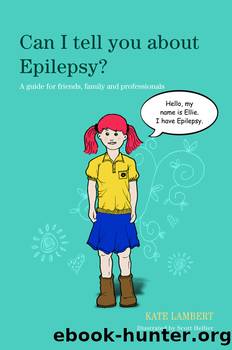Can I Tell You About Epilepsy?: A Guide for Friends, Family, and Professionals by Kate Lambert

Author:Kate Lambert [Lambert, Kate]
Language: eng
Format: epub
Tags: Family & Relationships, Children With Special Needs, Health & Fitness, diseases, Nervous System (Incl. Brain)
ISBN: 9781849053099
Google: DnASBQAAQBAJ
Publisher: Jessica Kingsley Publishers
Published: 2012-11-15T23:24:55.654950+00:00
How teachers can help
âEpilepsy is a variable disorder and it will affect us in different ways. Some of us may, at times, experience learning or behavioural problems. The impact of my Epilepsy must be considered according to my own individual experience.â
Learning and organisation
âIt is important that my teacher understands that the medication I take can have side effects. Medication can have different effects on people with Epilepsy so it is important that the class teacher knows it can affect my behaviour.
Many medications for Epilepsy can affect memory and so I can sometimes have difficulty remembering data and information. The seizures themselves can affect energy levels and focus, so un-medicated children may need extra help with organisation and self-management too. There are ways you can help with this:
⢠It may help me if information and tasks are broken down into small, manageable chunks. For instance, reading a paragraph, stopping and asking me questions about what I have read before continuing may help me to digest new information.
⢠Having a checklist in my desk or tray could help me with my organisation. My checklist could include a schedule of the dayâs events or reminders of what I need to bring home from school, like my instrument, homework or lunch bag. It could also have a section which can be pulled out and taken home to remind me what I need to remember to bring back to school for the next day. My teacher could encourage me to check my list at the end of the school day.
⢠To help with memory, older children may like to write reminder notes to themselves or may benefit from recording the content of an important class using a dictaphone, for example.
⢠Extra time in tests may help with my ability to recall information.
⢠It is easy to assume that the more subtle forms of Epilepsy have less impact on my learning. Absence Seizures can affect my learning if they are under-acknowledged. This is because the seizures can cause gaps in what I hear. If a question is presented to me verbally, for example âWhat is 2 + 2 + 4?â, I may hear âWhat is 2 + 2 blank?â and I may think that the answer is 4 instead of 8. If I am told my answer is wrong, this may lead to confusion and lack of confidence surrounding my learning. Visuals to support the questioning, such as formula or number cards, may help me. It is less likely that I will miss information that will still be visible when my seizure has ended.
⢠It would really help me if I was seated close to the teacher so that things can be repeated if needed without making me stand out too much. Sometimes I feel too embarrassed to say the things I have missed because I want to avoid giving attention to my seizures. Subtle questioning may help to decipher my understanding. As well as this, my teacher will have a better chance of spotting a seizure if I am seated nearby.
Download
This site does not store any files on its server. We only index and link to content provided by other sites. Please contact the content providers to delete copyright contents if any and email us, we'll remove relevant links or contents immediately.
Machine Learning at Scale with H2O by Gregory Keys | David Whiting(4295)
Never by Ken Follett(3937)
Fairy Tale by Stephen King(3370)
Will by Will Smith(2911)
Fantastic Beasts and Where to Find Them: The Original Screenplay by J. K. Rowling(2510)
It Starts With Us (It Ends with Us #2) by Colleen Hoover(2344)
Can't Hurt Me: Master Your Mind and Defy the Odds - Clean Edition by David Goggins(2324)
The Storyteller by Dave Grohl(2229)
Friends, Lovers, and the Big Terrible Thing by Matthew Perry(2219)
The Becoming by Nora Roberts(2189)
Cloud Cuckoo Land by Anthony Doerr(2102)
New Morning Mercies: A Daily Gospel Devotional by Paul David Tripp(1917)
A Short History of War by Jeremy Black(1842)
HBR's 10 Must Reads 2022 by Harvard Business Review(1840)
The Complete Witcher by Andrzej Sapkowski(1835)
Cytonic by Brandon Sanderson(1831)
Go Tell the Bees That I Am Gone by Diana Gabaldon(1754)
Leviathan Falls (The Expanse Book 9) by James S. A. Corey(1727)
A Game of Thrones (The Illustrated Edition) by George R. R. Martin(1722)
